We had an out of control pit bull underfoot growling at us and scaring the heck out of my little girl on the portage trails in the boundary waters in August. It would not obey commands from the guys who brought it in. It got distracted away from us when a lady with 2 dogs of her own came along. Then it was her turn to get scared. All the other dogs we've seen out canoeing have been in control and not at all scary, a little excited maybe, but no worries. Sometimes one bad apple ruins it for the rest of the barrel as far as fear of dogs goes.
-
Happi Founding of Apple Computer (1976)! 🍏🖥️
You are using an out of date browser. It may not display this or other websites correctly.
You should upgrade or use an alternative browser.
You should upgrade or use an alternative browser.
Solo tripping with a dog ...
- Thread starter Bob B.
- Start date
- Joined
- Jul 25, 2012
- Messages
- 838
- Reaction score
- 8
Hi Bob, Sorry for my part in that digression. Back to the discussion of the Chessie, yes or no.
I would suggest that it wouldn't be unreasonable to expect a hunting dog to want to hunt. So....much of your training effort will be in curbing that very natural inclination, which really, runs counter to what most of dog training is all about. In practical application that means that the dog ought to stay with you on a portage and not range about and also remain down where you want her in the canoe and not leap or fall out.
As I see it, with a retriever you start out with a couple strikes against you right away. You've got to control or curb those traits that were bred into the breed.
As far as the protective instinct on a portage, if you are talking about leaving your dog with some of the gear while you do a carry, I wouldn't do it. I don't trust people around my dog when I'm not there. Any of my dogs, ever. Saw another bumper sticker: "the more I see of people, the better I like my dog."
I don't blame you a bit for being enamored with the Chesapeake breed, they are such big hansom rugged guy's, maybe a way to think about it is consider six months of really diligent dog training. After that six months, you are starting to make a dent in the Chessie iron will. Or you could be polishing off the last of basic obedience with another dog.
Hmmmm.........let me think; which would I rather do?
Alan makes a very good point there; we are seeing a bunch of folks coming along who really don't understand dogs, haven't been raised with them and have no idea what the dog is telling them by his body language and mannerisms. I think a little compassion and instruction is indicated, but not to the point we canter to their phobias and reorder the world so they feel more "comfortable". Some of this yapping is the equivalent of a SIW, only they want the dogs to do the suffering.
Thanks for letting me natter.....
Rob
I would suggest that it wouldn't be unreasonable to expect a hunting dog to want to hunt. So....much of your training effort will be in curbing that very natural inclination, which really, runs counter to what most of dog training is all about. In practical application that means that the dog ought to stay with you on a portage and not range about and also remain down where you want her in the canoe and not leap or fall out.
As I see it, with a retriever you start out with a couple strikes against you right away. You've got to control or curb those traits that were bred into the breed.
As far as the protective instinct on a portage, if you are talking about leaving your dog with some of the gear while you do a carry, I wouldn't do it. I don't trust people around my dog when I'm not there. Any of my dogs, ever. Saw another bumper sticker: "the more I see of people, the better I like my dog."
I don't blame you a bit for being enamored with the Chesapeake breed, they are such big hansom rugged guy's, maybe a way to think about it is consider six months of really diligent dog training. After that six months, you are starting to make a dent in the Chessie iron will. Or you could be polishing off the last of basic obedience with another dog.
Hmmmm.........let me think; which would I rather do?
Alan makes a very good point there; we are seeing a bunch of folks coming along who really don't understand dogs, haven't been raised with them and have no idea what the dog is telling them by his body language and mannerisms. I think a little compassion and instruction is indicated, but not to the point we canter to their phobias and reorder the world so they feel more "comfortable". Some of this yapping is the equivalent of a SIW, only they want the dogs to do the suffering.
Thanks for letting me natter.....
Rob
That is an excellent call with a dog you do not know well, yet. I would definitely want to spend time a lot with them first, especially training time, to see for yourself how well they act, and respond.However, I know it's not. That dog is a loaded gun. I wouldn't take him canoeing, or anywhere off leash. Whatever happened to that dog in his previous life is unknown to us, and I'm not sure if it will ever be normal.
My Brittney Spaniel had an inexplicable appetite for human excrement.
I have seen many dogs that eat human excrement, I think it is the nature of the beast. One really funny situation involving this, and I will try to keep it subtle as possible given the subject, was on a backcountry ski trip with a buddy and our girlfriends. Buddy's dog did just what you describe while just the two of us were on the way back from a side ski trip, and when we got to camp, and before we could say anything, the dog ran went and gave buddy's girlfriend a bunch of big wet kisses on the face, while she just revelled with the attention. I held back a snicker for a while, but finally had to spill the beans........
Very true, Alan. I even know dog owners that can't tell that their dogs bark is actually not and aggressive one, and they act towards it like it wants to kill. As well as the dog owners that fail to see when there is aggression in their dogs demeanour.It's important, and difficult, to remember that how I perceive a dog's intentions isn't necessarily how others will see it. I think I've got a pretty good feel for the aggressiveness of a dog. Even if it's barking you can usually tell by body language how serious it is. Same goes for a mean dog that isn't barking.
But to people who don't have familiarity with dogs any barking dog can seem ferocious.
Not trying to say that people who have expressed concerns with aggressive dogs are mistaken but rather a reminder to us dog owners that we don't all have the same perception of reality.
I honestly believe that more than 99% of the dogs out there have the potential to be great dogs. I would also say then WAY less than 50% of dog owners do not do right by the dog with proper training.
A childhood friend's dad had a Chesapeake. He hunted with her. I remember her being a well behaved and trusted dog. She sure was beautiful too.
I've had far more good experiences than bad ones with dogs. Yes it's true that body language is important to understand, when spending any time with a new or strange dog. I'll never forget explaining to my young son the importance of not making eye contact with an excited dog standing guard behind a picket fence. I was helping my son deliver his newspapers on his paper route. "Don't be afraid. He's upset we're in his territory. Don't look at him, just walk up to the side door of the house and slip the paper behind the screen door. Ignore him, or talk quietly if you want to, but don't face him and stare. You'll be fine." My son approached the side door while I proudly watched from the end of the drive. The dog barked, as much for attention as for effect. Then my boy panicked, turned and stood frozen in front of the fence staring straight at the dog. KAPOW!! The dog went nuts!! That little four footed fella must've been waiting all week for some good old fashioned fun, and my son had just made his day! He took turns jumping at the fence, and trying to jump over it. After I stopped laughing, I had to walk up the drive to escort my frozen son away to continue the paper route. The next Saturday we delivered that paper together. There were no problems, and far less fun for everyone.
You weren't wrong Turtle, to express your desire for some simple peace and quiet. You posted in a friendly open minded way, and these forum friends here were open minded and easy going in their responses. It's all good. The poo poo eating pooch is gonna give me nightmares though. I've seen that before. Aack pthew. My in-law's dog used to wander around the village to find some nice stinky manure or road kill to roll in. She was a nice dog, but was really hard to love.
I've had far more good experiences than bad ones with dogs. Yes it's true that body language is important to understand, when spending any time with a new or strange dog. I'll never forget explaining to my young son the importance of not making eye contact with an excited dog standing guard behind a picket fence. I was helping my son deliver his newspapers on his paper route. "Don't be afraid. He's upset we're in his territory. Don't look at him, just walk up to the side door of the house and slip the paper behind the screen door. Ignore him, or talk quietly if you want to, but don't face him and stare. You'll be fine." My son approached the side door while I proudly watched from the end of the drive. The dog barked, as much for attention as for effect. Then my boy panicked, turned and stood frozen in front of the fence staring straight at the dog. KAPOW!! The dog went nuts!! That little four footed fella must've been waiting all week for some good old fashioned fun, and my son had just made his day! He took turns jumping at the fence, and trying to jump over it. After I stopped laughing, I had to walk up the drive to escort my frozen son away to continue the paper route. The next Saturday we delivered that paper together. There were no problems, and far less fun for everyone.
You weren't wrong Turtle, to express your desire for some simple peace and quiet. You posted in a friendly open minded way, and these forum friends here were open minded and easy going in their responses. It's all good. The poo poo eating pooch is gonna give me nightmares though. I've seen that before. Aack pthew. My in-law's dog used to wander around the village to find some nice stinky manure or road kill to roll in. She was a nice dog, but was really hard to love.
Last edited:
I have met few bad dogs or bad horses in my, but plenty of bad owners and trainers.
- Joined
- Dec 12, 2014
- Messages
- 364
- Reaction score
- 2
That's what pepper spray is for. Get it and use it..Once on a rail trail ....
Bob B, knowing where you are likely to trip my main concern hasn't been brought up yet. Wolves hate dogs and will tear them to pieces if they encounter one. I know it's a slim chance that this would happen but just be aware when you are traveling. I read a trip report a few years back where a fellow had to break camp in the middle of the night and take flight to save his German Shepherd. IIRC wolves were surrounding his camp and he used a bear banger to scare them off long enough to leave.
Rippy,
That is a good point, one I hate to think about. I have run across wolves on at least 3 occasions I can remember right off the top of my head - one was very curious and made a point of running my back trail ... as I hiked and back tracked, I found its foot prints in my boot tracks 3 times ... kinda gave me the creeps.
Bob.
That is a good point, one I hate to think about. I have run across wolves on at least 3 occasions I can remember right off the top of my head - one was very curious and made a point of running my back trail ... as I hiked and back tracked, I found its foot prints in my boot tracks 3 times ... kinda gave me the creeps.
Bob.
Bob, if you want to read the TR I was refering to search "Cassie and the wolves" and you will find it. Dave
So having spoken with Bob since the start of his thread I'd like to add a couple points based on the original question targeted at Chessies. Chessies are excellent family dogs if the family agrees to the rules and training techniques and adheres to them day in and day out. All dogs need basic training, even my little maltese. I based my training methods around retriever training books to teach her the basics and used exercise as a prime tool too. I think it's been mentioned already, but a tired dog is a good dog. Chessies are EXTRA strong willed for much longer than a lot of other breeds. AKC descriptions say they take longer to mature (about two years old). Quite frankly, unless you're like that Ceasar guy, once a Chessie knows a command (usually the same day you teach it), quick and sharp physical correction is required for infractions. In other words, Chessies don't get timeouts. Some breeds will not take this type of training too personal (goldens and some labs), but Chessies tolerate punishment when they understand why it's being given. Chessies are very loving towards family and those they know well but are otherwise usually reserved. Socialize them or they may become biters. They are not the typical happy go lucky lab type. Some people might tell us that a dog has to be trained like a field trial champion to be a tripping dog and that's really not the case. Really the dog needs to come, sit, stay, not bite, bark excessively, or tip the boat over. My dog barks occasionally when she hears people talking on the other side of the lake, so what? I figure if you're talking loud enough that we can hear you why should my dog be held to a higher standard then you? She'll pipe down when I tell her to. After the basics, the dog should be able to sit in the boat until you tell the dog otherwise.
Bottom line, you need to be the clear boss all the time, and provide swift and sure correction for every minor infraction of commands/behaviors that they have demonstrated an understanding of, and copious amounts of hard exercise. It's tedious, frustrating, and rewarding work. In return you will get some serious devotion and respect. I started teaching my dog to sit while my brother drove us home from the breeder's. My advice and that of others here applies to all breeds really. The application and duration is just more intense with Chessies than other retrievers probably.
All things equal in the obedience department, the only real drawbacks I see to week or longer trips with a Chessie is their size. You might be up to 14 lbs. of food per week not including treats. Its bulky and heavy. You're going to need a bigger tent, and they deserve a decent sleeping pad even though they propably won't use it. When a Chessie isn't centered in the boat you know it. The AKC standard for Chessies does not seem to really quantify the average chessie that I've seen. Mine is 90 lbs. and she's a lean, mean machine. I keep her light to protect her joints. The other issue with Chessies is their susceptibility to ruptured cruciate ligaments. Chessies are decedents of the Newfoundland and together they make up two of the top six breeds likely to sustain the injury. I spent $4000 to repair one knee and there's a high likelihood that the other one will need done at some point. Spayed and Neutered dogs increase the risk.
If I ever own another breed, it will be just because of size but I doubt that will happen. For anyone who ever decides to go with a Chessie, do so knowing that you have to put the time in and stick it out. They are really smart and want to do the right thing. Failing a Chessie is a big deal and they don't do well with adoption. Most rescue dogs are given up because the owner found them too much to handle. If you are not sure, consider a lab.
If you get one, POST YOUR PICS!
Learning to canoe
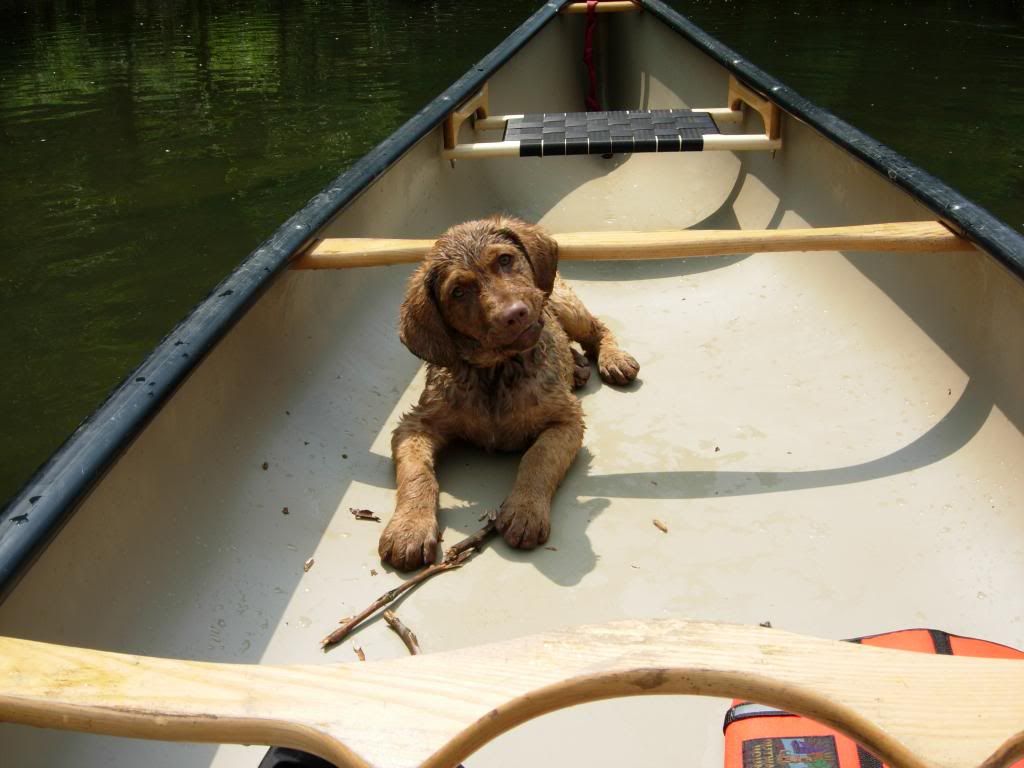
Good behavior deserves tasty treats...
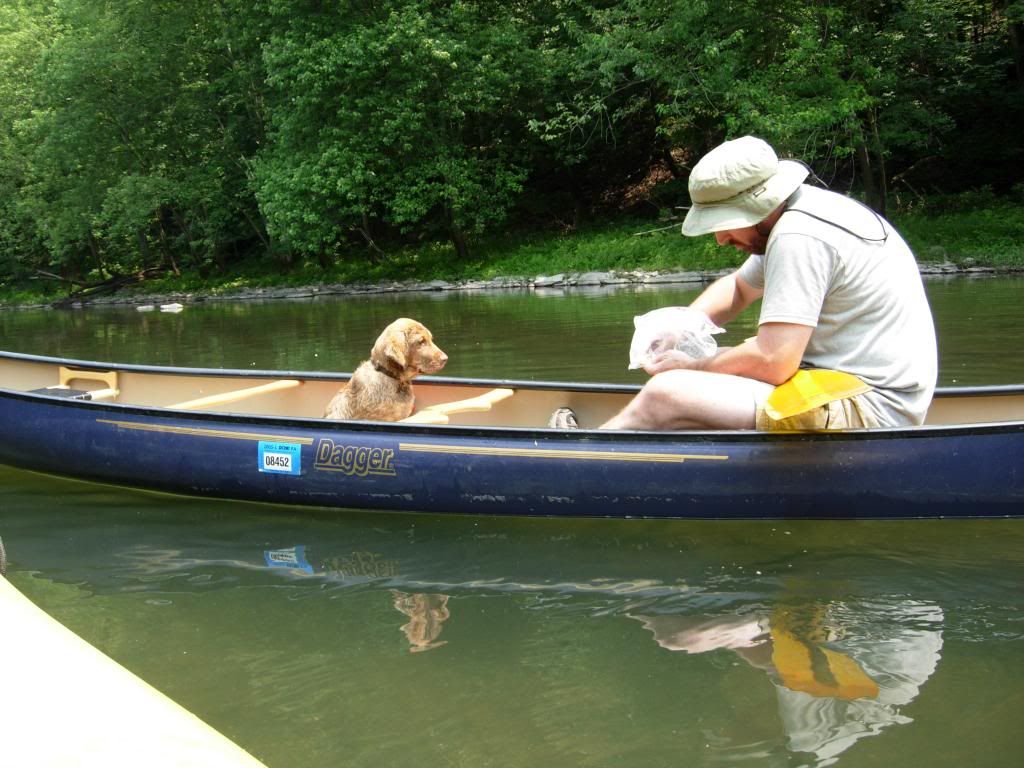
Nobody is perfect, I should have perceived this bad habit when she was a bit smaller.
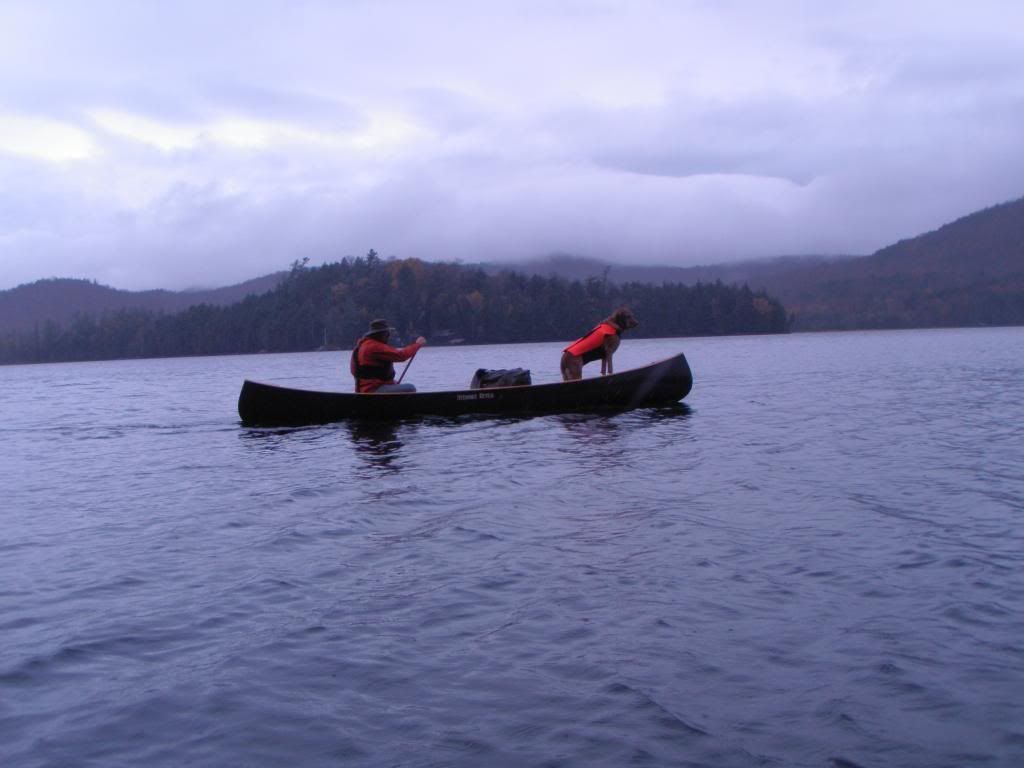
She's steady and trusts me, even when dragging her over obstacles
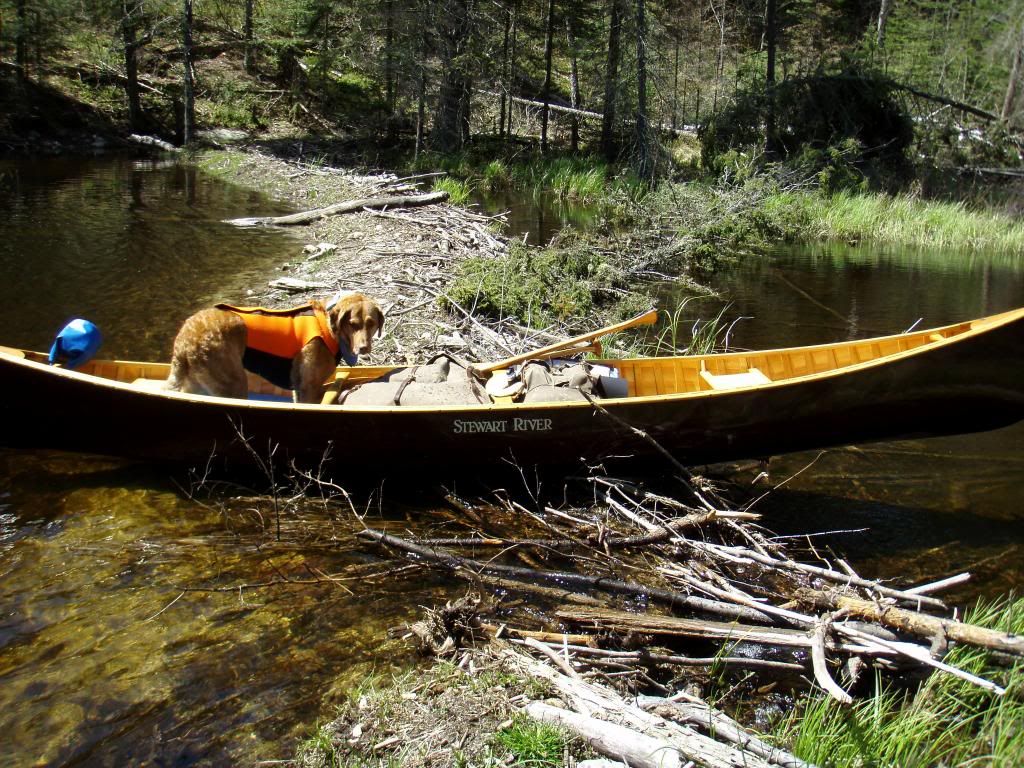
Rippy is dead on with wolves. If I solo the Bloodvein, she will have to stay home since I would have to tie her up at the end of the portage while I run the rapids. Here she's listening to a pack of wolves about 3-400 yards away. I told her not to bark, put her collar on and tied her to a tree. She never made a peep.
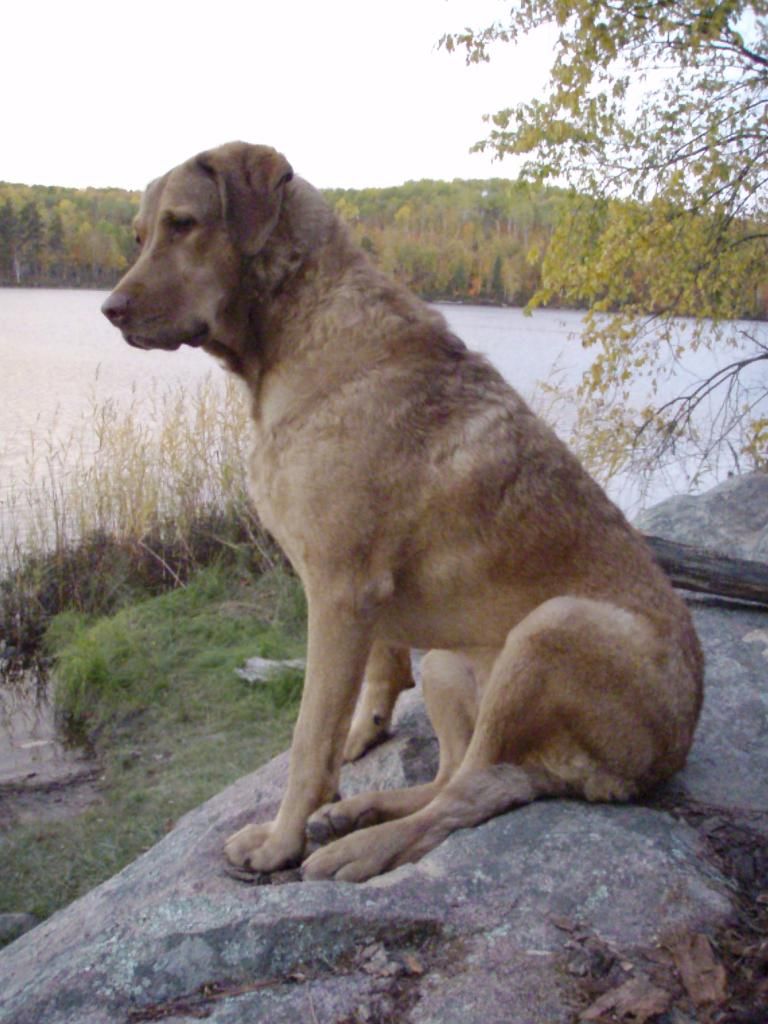
Almost 8 and getting a little grey. Hanging out in the ADK, she just gets better and better.
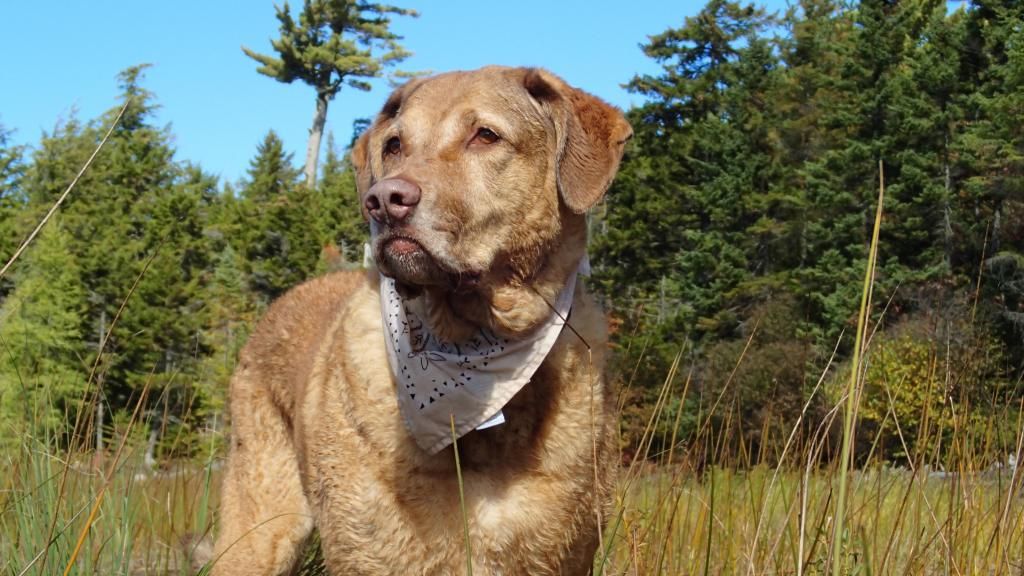
Cheers,
Barry
Bottom line, you need to be the clear boss all the time, and provide swift and sure correction for every minor infraction of commands/behaviors that they have demonstrated an understanding of, and copious amounts of hard exercise. It's tedious, frustrating, and rewarding work. In return you will get some serious devotion and respect. I started teaching my dog to sit while my brother drove us home from the breeder's. My advice and that of others here applies to all breeds really. The application and duration is just more intense with Chessies than other retrievers probably.
All things equal in the obedience department, the only real drawbacks I see to week or longer trips with a Chessie is their size. You might be up to 14 lbs. of food per week not including treats. Its bulky and heavy. You're going to need a bigger tent, and they deserve a decent sleeping pad even though they propably won't use it. When a Chessie isn't centered in the boat you know it. The AKC standard for Chessies does not seem to really quantify the average chessie that I've seen. Mine is 90 lbs. and she's a lean, mean machine. I keep her light to protect her joints. The other issue with Chessies is their susceptibility to ruptured cruciate ligaments. Chessies are decedents of the Newfoundland and together they make up two of the top six breeds likely to sustain the injury. I spent $4000 to repair one knee and there's a high likelihood that the other one will need done at some point. Spayed and Neutered dogs increase the risk.
If I ever own another breed, it will be just because of size but I doubt that will happen. For anyone who ever decides to go with a Chessie, do so knowing that you have to put the time in and stick it out. They are really smart and want to do the right thing. Failing a Chessie is a big deal and they don't do well with adoption. Most rescue dogs are given up because the owner found them too much to handle. If you are not sure, consider a lab.
If you get one, POST YOUR PICS!
Learning to canoe

Good behavior deserves tasty treats...

Nobody is perfect, I should have perceived this bad habit when she was a bit smaller.

She's steady and trusts me, even when dragging her over obstacles

Rippy is dead on with wolves. If I solo the Bloodvein, she will have to stay home since I would have to tie her up at the end of the portage while I run the rapids. Here she's listening to a pack of wolves about 3-400 yards away. I told her not to bark, put her collar on and tied her to a tree. She never made a peep.

Almost 8 and getting a little grey. Hanging out in the ADK, she just gets better and better.

Cheers,
Barry
Thanks for sharing the pictures Barry. I love the top one.
Dogs are in charge of campsite security. I like to sleep with them when my honey is not around.
Similar threads
- Replies
- 34
- Views
- 1K
- Replies
- 39
- Views
- 2K
- Replies
- 18
- Views
- 2K
